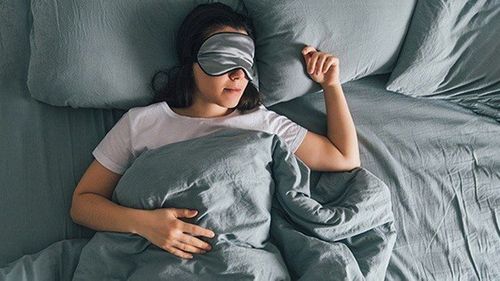This is an automatically translated article.
Too little sleep time, too much sleep or frequent changes in sleep time can all lead to the risk of memory problems in women, especially in middle age.
1. Too much or too little sleep affects memory
A reliable study was conducted on about 15,000 women aged 70 years and older, without problems such as depression or stroke, and the results were as follows: participants had too little sleep (under more than 5 hours) or sleeping too much (9 hours or more) per day had worse memory than those who slept for 7 hours a day. This difference, the researchers say, equates to memory decline over two years of age. At the same time, women whose sleep duration varied by more than 2 hours per night had worse memory than those with consistent sleep. This study was published in the Journal of the American Geriatric Society.
Given the importance of memory preservation, more research is needed to establish with more certainty the modifiable memory influencers (such as sleep habits), thereby achieving the stated goal of memory preservation. It can be seen from the above study that it has been shown that an average amount of sleep (about 7 hours per day) can help people maintain memory, so sleep therapies should be applied clinically to prevent prevention of dementia in women.
Changes in sleep habits are common in patients with Alzheimer's disease or other dementias. They may often wake up in the middle of the night and have trouble getting back to sleep. Brain changes in Alzheimer's disease affect the sleep-wake cycle. Studies have suggested that changing sleep habits too soon may contribute to dementia risk later in life. Both too little or too much sleep are associated with a higher risk of dementia, especially memory loss in women. However, there is no evidence to determine whether these sleep changes contribute to the disease or simply the initial symptoms.
Research led by Dr Séverine Sabia (of University College, London) looked at how sleep changes early in the life cycle can impact health, especially on memory. The study examined data from 8,000 people in the UK aged 50 and over. Participants were assessed using a variety of measures, including answering survey questions six times between 1985 and 2016 on how many hours they sleep each night. To assess the accuracy of this self-report, several participants used a device that objectively measured sleep duration. During the study, 521 participants were diagnosed with dementia, with an average age of 77.

Ngủ quá nhiều có thê ảnh hưởng tới trí nhớ ở phụ nữ
Analysis of data shows that people in their 50s and 60s who sleep less than 6 hours a night have a higher risk of developing dementia. Compared with people who slept normally (defined as 7 hours), those who got too little sleep each night were up to 30% more likely to be diagnosed with dementia.
The researchers adjusted their model to account for other factors that may influence sleep patterns or dementia risk, including smoking, physical activity, BMI and medical conditions (such as diabetes and heart disease). At the same time, the study also separated participants with mental illnesses such as depression because they are closely related to sleep disturbances.
Findings suggest that too little sleep in middle age may increase the risk of developing dementia later in life.
Many previous studies have linked poor sleep with a higher risk of heart disease, stroke, type 2 diabetes, and depression. People who regularly sleep too little are more likely to have high blood pressure, diabetes, and narrowing of blood vessels. All of these conditions can lead to decreased blood flow inside the brain. On the other hand, brain cells need a lot of oxygen and sugar to function, so problems with reduced blood flow can affect their ability to function normally.
Besides, poor sleep can affect the brain in different ways. A study in mice showed that sleep-deprived mice excrete more of a protein (amyloid beta) in the brain than mice that were normally asleep. In humans, beta amyloid deposits in the brain have been linked to impaired memory and thinking, and an increased risk of dementia. In contrast, people who slept too much (more than 9 or 10 hours per night) often had worse sleep quality.
Another possibility is an inverse relationship between sleep and memory: The quality of sleep can affect memory and thinking, and conversely, brain changes cause memory problems and impaired thinking. thought it might disturb sleep.
2. Some tips for a good night's sleep
Some tips that can help you get a good night's sleep are as follows:
Establish a regular bedtime and practice a relaxing bedtime routine, which may include taking a warm bath or listening to soothing music; Use the bed only for sleeping, avoid reading and watching TV in bed; If you can't fall asleep after 15 to 20 minutes, get out of bed and do something relaxing (like reading a book). Do not watch TV or use computers because the blue light from their screens has a stimulating effect. When you feel sleepy, go back to bed to sleep; Move a lot, do moderate exercise about 45 minutes a day; Schedule stressful or thought-intensive tasks early in the day and less challenging activities at night; Don't go to bed hungry, but don't eat too much before bed. If you want to have a snack before going to bed, you need to limit the food too much salt; Limit the use of caffeine and absolutely do not use it after 2 pm; To reduce urination in the middle of the night, limit drinking a lot of water after dinner;

Tập thể dục giúp bạn có giấc ngủ ngon không ngủ quá nhiều và quá ít
Avoid drinking after dinner time. Although many people think of it as a sedative , it can interfere with a quality sleep ; Make sure the bed is comfortable, the bedroom is dark and quiet. Alternatively, you might consider using a sleep mask or earplugs; Don't nap too much: If you need a break, you can take a 20 to 30 minute nap; Practice relaxing breathing, using slow breaths, especially on the exhale. Sleeping too much or too little affects health, especially memory in women. Therefore, you should follow a healthy lifestyle, maintain good quality sleep to ensure the best health.
Follow Vinmec International General Hospital website to get more health, nutrition and beauty information to protect the health of yourself and your loved ones in your family.
Please dial HOTLINE for more information or register for an appointment HERE. Download MyVinmec app to make appointments faster and to manage your bookings easily.
References: webmd.com, .health.harvard.edu, .nih.gov












